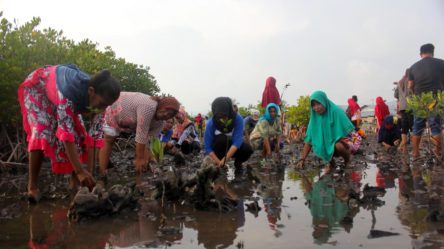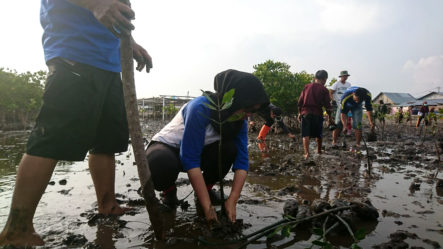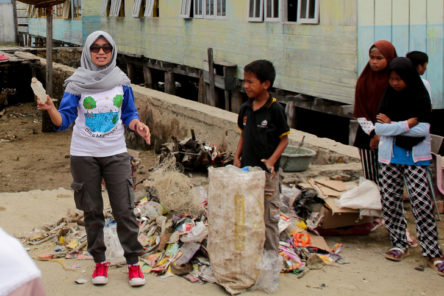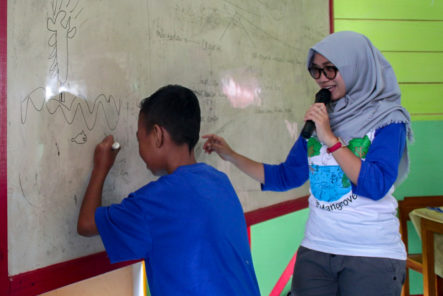This post is also available in:
 Indonesian
Indonesian
Ibu (ma’am), do you realise that the weather is different from how it used to be? The climate is changing, fishers go further to catch, why? Coral reefs and mangroves are habitats for marine life, so if they are damaged, we need to look elsewhere to find fish. We need to prepare more fuels, more energy and money – we will not benefit from damaged environments.”
Nurain Lapolo recounts a conversation she regularly has with women in Indonesia’s coastal villages where she works.
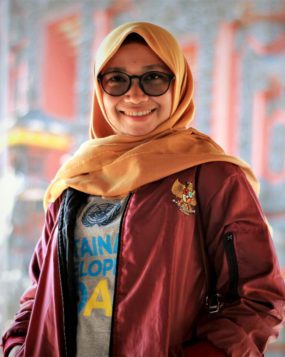
Nurain Lapolo, director of Japesda | Photo: Japesda
That day, I sat down at my laptop to talk with Nurain, who is Japesda’s director. She had just got back home from work and we were having a catch up at the end of our day. Whenever I speak to her, I can feel her passion for conservation and community empowerment brightly radiating from this young leader. She strongly believes in the power of women in helping build a sustainable future for all.
Ain (which is her nickname) is the eighth director of Japesda, but is also the first female director since the organisation was established in 2000. As a community-based marine conservation organisation and a partner of Blue Ventures, Japesda does incredible work empowering coastal communities in Gorontalo and Central Sulawesi to manage their fisheries more sustainably.
Japesda builds strong networks and partnerships with government, NGOs and fellow community-based organisations, as well as the private sector, to advocate for sustainable livelihoods for Indonesia’s coastal communities. Japesda is currently supporting the community in Uwedikan, enabling them to lead marine conservation efforts to manage and protect their octopus fishery.
Falling in love with community conservation
As we talked, Ain shared her story, “I was born into a farming family. I grew up close to the mountains, and I loved being on the farm with my family”. She told me that her first encounter with conservation and environmental science was during her undergraduate degree in Biology at Gorontalo State University.
“I was always curious to learn more about biology. I thought there must be more things to explore,” she said. “My professor made me realise that biology is not only about memorising all those scientific names, but beyond that, it’s about humans, plants, and animals being interconnected. It’s about our life all together”.
“During my studies, I took part in a community service project, in Torosiaje, Gorontalo Province. We focused on mangrove restoration and developing alternative livelihood opportunities for women’s groups,” Ain continued excitedly, “We worked with women in the community, training them to use mangrove fruit to make food products like pies, cakes and juice, so that they could sell them at the market”.
This was when I became interested in coastal communities and saw the potential for women to get involved in marine conservation. I also saw that they needed support and assistance to do so,” said Ain.
Through this project, Ain found her love for community empowerment and in 2018, she completed her postgraduate degree in Environmental Management to support her new career ambitions. During her postgraduate education, Ain provided expertise to several mangrove conservation and sustainable management projects across Indonesia. After graduating, she became the programme manager for a community livelihoods initiative in Pohuwato regency, Gorontalo.
“The most important part of the programme was to invite the community, particularly women, to care about climate change by protecting and preserving coastal and marine areas now and in the future,” Ain told me.
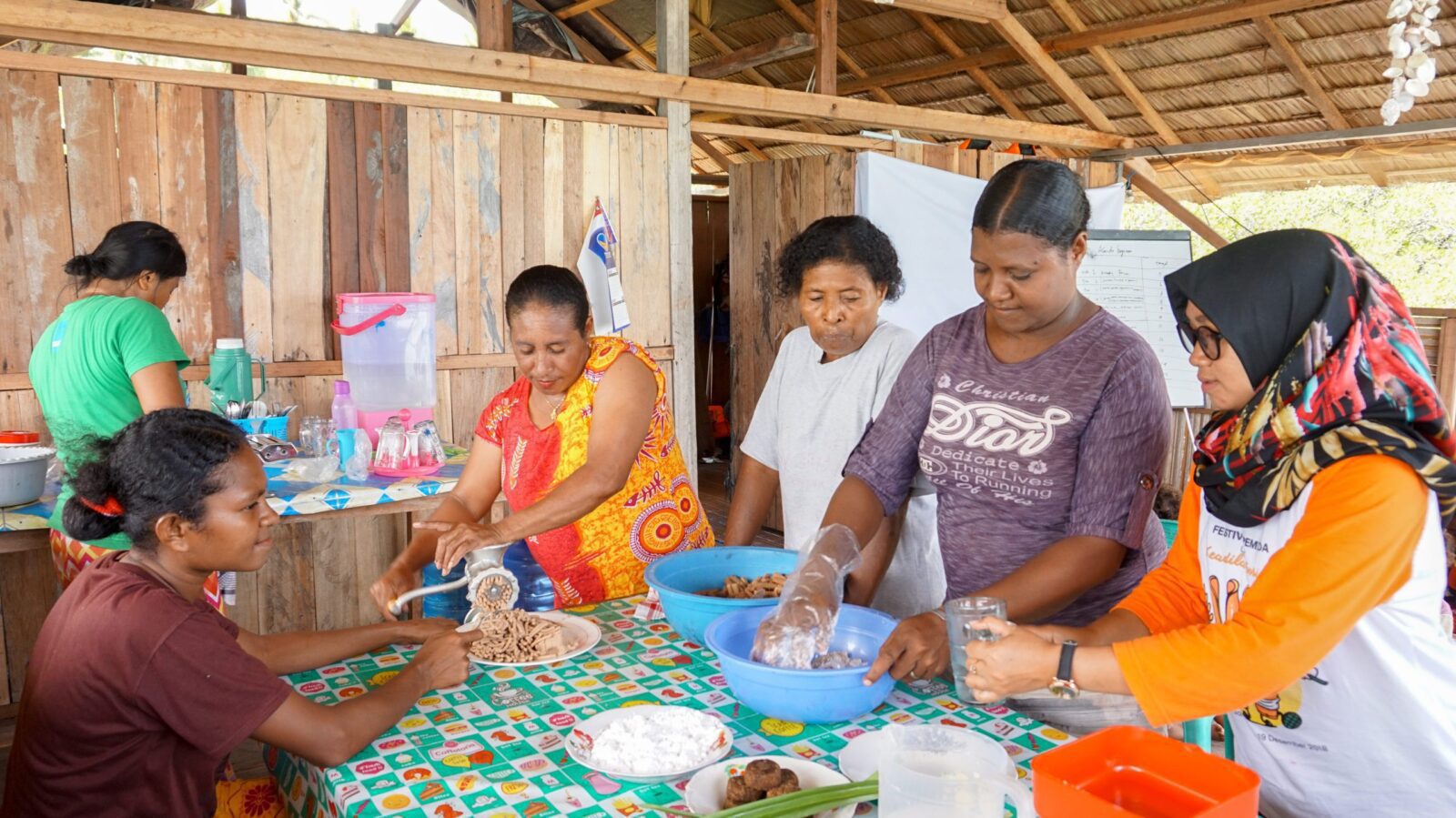
Ain (right) recently visited West Papua to train women in processing mangrove fruit | Photo: Japesda
Helping women to become conservation heroes
Ain loves to travel, meet new people and talk to them about their environment. “I believe that the more we are aware of the importance of the environment, the more we want to take care of it,” she said. Working amongst coastal communities in Gorontalo and Central Sulawesi, Ain has this opportunity every day – it’s what she loves most about her job at Japesda.
Ain told me that it’s her pride and joy seeing women in the community getting involved in conservation efforts. She gave an example of one woman she worked with in Torosiaje Jaya Village, called Nurwati Pakaya. With Japesda’s support, Nurwati is now a mangrove protector and an expert in transforming mangrove fruits into food products to support her family’s income.
“Women play important roles in conservation and fisheries management,” Ain continued, “I believe it’s really important to empower women because they are the influencer in their families. They are close to natural resources, and they have the power to manage them sustainably”.
Women are on the frontlines of this fight on climate breakdown – and we are affected by it the most. We need to make room for more women to be involved in sustainable natural resource management,” she added.
When women learn and lead
Ain has always been an eager learner which has helped her become the strong leader that she is today. “I’m grateful that I have a good support system of people who truly believe in me,” said Ain. “I believe that women have their own strength in leadership,” she added.
During her three years of leadership, Ain has made a lot of changes within Japesda. She has improved the quality of human resources, opened up opportunities for volunteers to learn about conservation, improved administration within the organisation, and even led an awareness raising campaign to advocate for sustainable natural resource management to a larger audience, partnering with an Indonesian journalist association in Gorontalo.
Recently, Ain and the Japesda team reached a significant milestone. She was more than proud to tell me that the Uwedikan and Lambangan communities in Central Sulawesi have successfully rehabilitated an area of mangrove – around 10 hectares. This has led to the establishment of a Marine Protected Area (MPA) covering over 700 hectares in total.
When people doubt you, just be consistent in what you do, so that they will believe your actions – more than your words,” said Ain. “Don’t give up, despite challenges that you may face.”
When I asked her about her hopes for the future, she smiled – another thing she loves to do – and said, “I hope that women won’t have to feel small and isolated. We should always feel confident to speak up. I also hope that Japesda will continue in growing our partnership network with more organisations, empowering us to support more coastal communities across Indonesia.”
Explore our Women in Fisheries blog series
Find out how Japesda continued supporting community-led data collection through COVID-19
Learn more about how Japesda is supporting the Uwedikan community in Central Sulawesi


